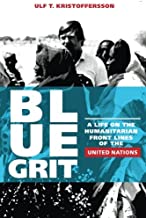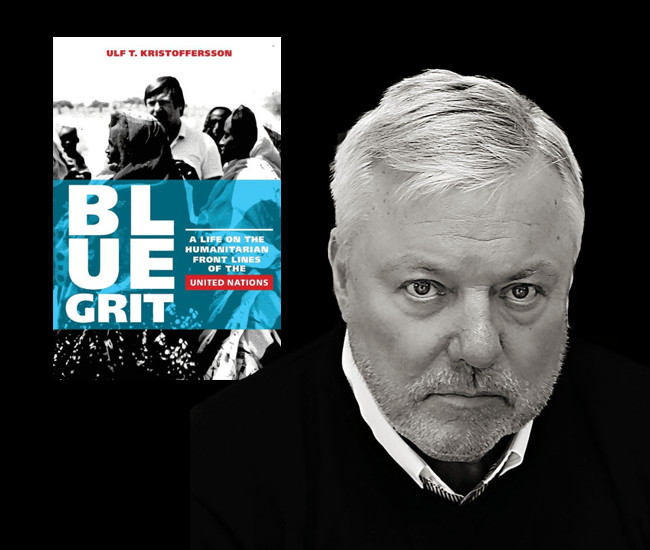Blue Grit by Ulf T. Kristoffersson
What's It About?
“I have been shot at, taken hostage, bombed, threatened, and evacuated. I’ve witnessed the evidence of massacres and famines. I’ve put colleagues in body bags.”This is no global thriller we’re talking about. Those are the words of Ulf T. Kristoffersson, reflecting on his real-life 40-year career with the United Nations in his fascinating and often-harrowing memoir, Blue Grit: A Life on the Humanitarian Front Lines of the United Nations (CreateSpace).
Kristoffersson served six Secretaries-General, joined four UN agencies, was posted to 17 duty stations, operating in nine emergencies and traveled to close to 100 countries. His memoir is an up-close account of how the United Nations operates, how it affects the people who serve it, and a primer of history and the international crises in which the UN has tried to step in and offer relief.
“I do not pretend that my story is unique or, conversely, stereotypical of an international civil servant or humanitarian emergency aid worker.”
The author notes that some workers show up regularly at every emergency and others avoid fieldwork altogether but still achieve important humanitarian objectives. There are global citizens who can make every country feel like their home and technology wizards whose behind-the-scenes contributions play important roles.
“I am a little bit of all those types,” Kristoffersson writes. “I assess an emergency without romance and with a tested blueprint in hand. I put my shoulder to the wheel and roll up my sleeves.”
Kristofferson says the United Nations it is not so much a single entity but an intricate system – a network of agencies, programs, and funds that share a common vision: to mitigate the effects of natural and manmade emergencies and to advance the health of people worldwide, and to prevent war through peacebuilding and peacekeeping.
Yet with those goals come danger. “Its employees are kidnapped, killed and tortured regularly, and often in places where extreme insecurity and governmental dysfunction renders their presence symbolic at best.”
“At what cost do we give our commitment? And how do we tally the cost of hope when it is left in the dust of departing UN vehicles?”
It’s a life in which you are assigned to a station without much choice. A two-week stint can morph into two years.
One of the author’s assignments involved the Cambodian refugee crisis in the mid-Seventies when hundreds of thousands rushed to the border of Thailand to escape violence and avoid famine.
“The Cambodian refugee crisis showed the United Nations at its very best and worst. If the mass murder of two million Khmers was the fault of an insidious fanatical faction, the long displacement of one million more was largely the result of the UN’s impotence to enforce moral reparation for that crime.”
Danger could never be discounted. Kristoffersson describes the foot soldiers under Cambodia leader Lon Nol and how instincts play a crucial role in survival: “Armed, drugged and mentally unhinged, the worst of them were deadly…I had a close encounter with one in a bakery one morning. I was paying for my baguette when a soldier, swaying and visibly impaired, entered. Instinctively I left without my change. Moments later the bakery exploded. The soldier had snapped and pulled the pin on his last grenade.”
Taking stock of the United Nations two generations after its founding, the author notes that it has “weathered scandals, absorbed defeats and seen its shield turned into a target.” But he still has hope for its future.
As for those who choose to serve the UN, Krisoffersson stresses the qualities of leadership, teamwork, and a “critical balance between high-level international crisis negotiation and ‘bush diplomacy.’”
The number of captivating anecdotes in Blue Grit is too high to list here. Readers will not find a more candid inside look at this important organization, analyzed not only with a bird’s eye view but from deep in the trenches, with the stains of peoples in the throes of assault and struggling to survive. Kristoffersson is a worthy guide. One can only marvel at the life he’s led.
Blue Grit is available for purchase.
Buy this Book!
Amazon





You made a compelling case for buying this book about the UN!